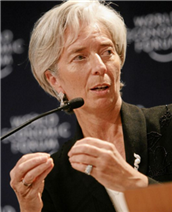Low commodity prices could persist says Lagarde


Christine Lagarde speaking at the World Economic Forum in Davos, Switzerland. Image from Wikipedia.
With China emphasising consumption over investment, there 'could be a prolonged period of low commodity prices', said Christine Lagarde, Managing Director of International Monetary Fund.
Lagarde, who was speaking to the Council of the Americas today, said China is transitioning to a new growth model, one that emphasizes consumer spending over large capital projects.
Lagarde calls the changes necessary and healthy, but bad for the people making copper, steel and coal.
Emphasis IMF:
[China] is in the midst of a fundamental and welcome transformation. It has launched deep structural reforms to lift incomes and living standards. These reforms will, by design, lead to a "new normal" of slower, safer, and more sustainable growth. The new model relies more on consumption and less on commodity-intensive investment. More on services and less on manufacturing.
It also requires transitioning to a stable, more market-driven financial system. In other words, China's policymakers are facing a delicate balancing act: they need to implement these difficult reforms while preserving demand and financial stability.
As I said, this kind of major transition can create spillover effects - through trade, exchange rates, asset markets, and capital flows.
We saw some of these spillovers in recent months: investors were worried about the speed at which China's economy is slowing. These concerns put further pressure on commodity markets and triggered sizeable currency depreciations in a number of commodity exporters.
Those countries have, for many years, relied on China as an export destination. For example, China consumes 60 percent of the world's iron ore. But as it invests less, China will reduce its appetite for commodities.
This will contribute to what could be a prolonged period of low commodity prices - a change that will need to be managed by policymakers, particularly in the large commodity exporters.
So how do resource-driven countries adujust? Lagarde says governments should pass growth-friendly fiscal rebalancing, which includes tax reforms, energy pricing reforms, and by reprioritizing spending that will protect the most vulnerable.
"Commodity exporters such as Colombia, Norway, and Botswana used the commodity boom to strengthen their fiscal frameworks against shocks. This has put them in a position where they can better determine the pace of necessary fiscal adjustment and thus preserve growth."